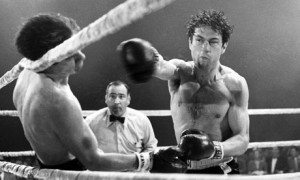RAGING BULL (1980)
PETRELLA v. METRO-GOLDWYN-MAYER, INC., et al
Vetting and clearing underlying works often goes far beyond merely signing an option/purchase agreement. Every film and television project needs to document any inspiration for the screenwriter’s work, whether it is wholly fictional or openly based on a life story or existing work. Once documented, it is crucial to determine which works need to be sought out for licensing. In the case of Martin Scorcese’s Raging Bull, the basis for the final film went layers deeper. Paula Petrella filed suit again MGM for copyright infringement, claiming that the basis for the film was the screenplay written by her father, Frank Petrella.
MGM had purchased the rights to a book written by Frank Petrella and Jake LaMotta (the boxer whose life inspired the film), and assumed that their bases were covered. Ms. Petrella claimed that a screenplay written by her father predated the book and was never licensed or purchased by MGM. This case found its way to the Supreme Court, with numerous technical legal arguments being made by both sides. Ultimately, the SCOTUS kept the case alive and kicked it back to district court. Ultimately, the parties settled out of court along with the standard confidentiality agreement to keep the settlement undisclosed to the public.
The lesson here is that you cannot dig too deep when uncovering underlying works and inspiration for your project. If your film has any success at all, anyone with even the slightest hint of a legal claim is going to come crawling out of the woodworks. Even if you have the law on your side, the litigation can tie you up for years (or even decades). If you don’t have the deep pockets of a major studio the end result is likely to be the shelving of your project or the loss of any realized profits. Proper and thorough clearance procedures are the best way to shield your project (and yourself) from disaster. Learn more about copyright reports and chain-of-title opinions.

